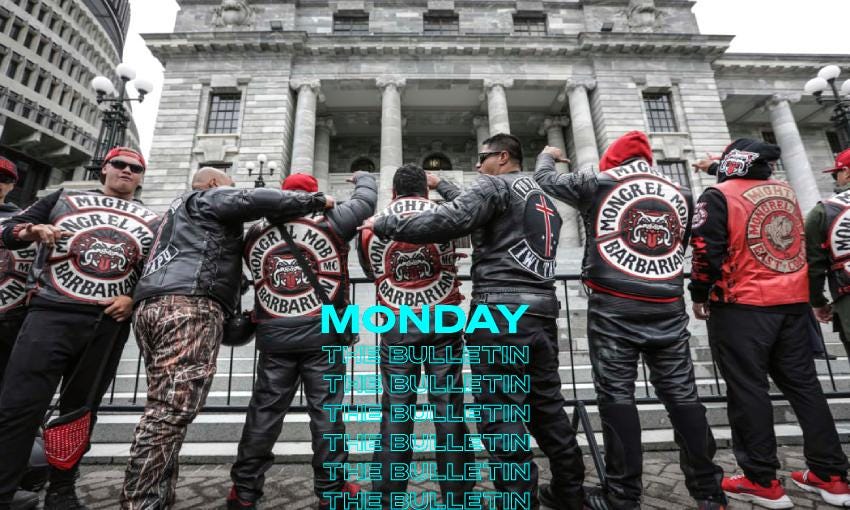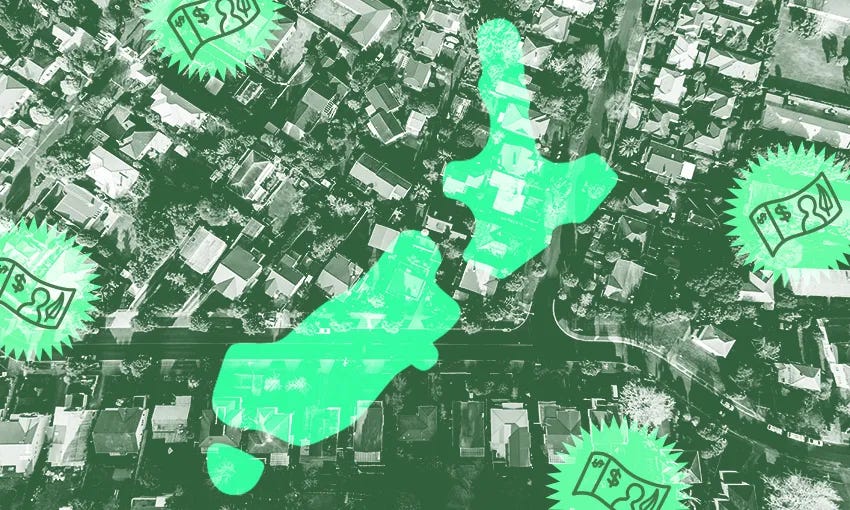History repeats on crime rhetoric
The National party has released its plan to deal with gangs. It's been criticised as impossible to police and echoes a long history of tough on crime rhetoric from politicians.
Mōrena and welcome to The Bulletin for Monday, June 13, by Anna Rawhiti-Connell. Presented in partnership with Z Energy.
In today’s edition: firefighters to strike; 3000 submissions on future of stadium; school leaver rates decline; but first, political posturing on gangs.
An endless source of political rhetoric (Photo: RNZ / Rebekah Parsons-King)
It’s 1990 and John Banks is in a trenchcoat
In 1972, both National and Labour ran newspaper ads in the run-up to the election that promised to get tough on crime. Labour’s manifesto categorised criminals as “hooligans” and motorcycle owners. National’s promised more police. In 1987, then justice minister Geoffrey Palmer told voters that they had put more police on the street. In 1990, National put John Banks in a trenchcoat to say that they would put more police on the streets. In 2014, John Key said that targeting gangs is about reducing crime, not scoring political points, weeks out from the general election. In 2017, an election year, Labour’s then police spokesman Stuart Nash called on the National government to take the “real action required to smash gangs once and for all”.
National wants gang insignia banned from cyberspace
If you want an early preview of a strand of next year’s election campaign, you could start with the chapter on crime in Claire Robinson’s book about the history of political campaigning in New Zealand. Campaigning has arguably kicked off early with National announcing its gang policy on Saturday at the Northern regional conference. It proposes a range of measures including banning gang insignia in public and on social media, with fines for both. Former National MP Chester Borrows said it would be mostly ineffectual in practice. Internet NZ’s Andrew Cushen said the approach to social media is nearly impossible to police.
A battle between our rational and limbic brains
I live in an area where a gang shooting recently occurred. You can see the temptation of the political play laid bare in our local community Facebook groups where people are blaming the police minister. No matter your opinion on Poto Williams’ performance, I thought John MacDonald had a pretty measured response to that. But you can also see the challenge for a government inclined to see gangs as the product of complex social issues that will be solved in some distant future. They can’t keep offering that up as an answer to people who are scared and intimidated in the present day. Armed police blocked off our street the other night. For all my rational thinking and reading, I found myself thinking “Why won’t they do something about the gangs?” The power of the tough on crime rhetoric exists in the battleground between our rational and limbic brains.
Depressing familiarity and no real solutions
I spent a delightful 24 hours in Featherston at Booktown over the weekend. At the poet’s session, Glenn Colquhoun read a poem where he’d picked up the “National Mum and Labour Dad” line from Jame K Baxter’s Ballad of Calvary Street to express a frustration at political posturing and its antithetical relationship to what people actually need. This exasperation is mirrored in a column from Stuff’s Andrea Vance yesterday headlined “Beware the politicians who promise to solve crime”. Vance writes: “When you cover politics, some subjects come around with depressing familiarity, like dishwater circling a drain.”
Auckland is in a perpetual cycle of growth and change, and right now its residents are demanding more variety in housing options. But how will the city keep up with the demands of its growing population? Ben Fahy wrote for The Spinoff about what makes a city liveable, and how we begin to make Auckland a place with housing options for everyone. Read the full piece here. (Sponsored)
Consultation on stadium more popular than budget
The Christchurch city council had received 3000 submissions by late Friday on the future of the proposed stadium after opening consultation at midday that same day. They received 500 submissions on its latest budget over the course of a month. The council is consulting the public after the forecast costs to build the stadium increased from $533m to $683m. Things are getting heated with Crusaders forwards coach Jason Ryan questioning mayor Lianne Dalziel’s commitment to the project, while Dalziel has said she is frustrated at the nature of some of the debate. In other stadium and sportsground news, New Plymouth’s Pukekura Park may need a serious upgrade if they want to continue hosting cricket and the trust behind Wellington’s Sky Stadium has had to scale back its insurance cover due to rising insurance costs.
Firefighters to strike from today
The strike action will not affect firefighters who will be responding to fires and emergencies as usual. Year-long pay talks between the professional firefighters union and Fire and Emergency NZ stalled and members voted to strike at the end of May. The union had asked for an 18% pay rise over three years. Union national secretary Wattie Watson said members want Fire and Emergency to address wages, working conditions and staffing ratios. She said staffing levels had not increased since 1980. Fire and Emergency NZ chief executive Kerry Gregory has previously refuted that, calling it alarmist language and saying there had been variations in staff numbers since 1980 but staffing was sufficient to serve communities.
A message from senior writer Alex Casey:
Earlier in the year we published When the Lessons End, an in-depth examination of one woman’s experience at the hands of her private music teacher, and the impact it had on the rest of her life. Stories like these take months of rigorous reporting, travel costs and hefty legal fees to get to publication stage, all of which was only possible thanks to our members.
I feel so lucky to work for an organisation that encourages long-form investigative journalism, but the reality is that this work is impossible without the ongoing support of our readers. If you can, please support our work by donating today.
New research into under 25s in Auckland
Picking back up on the school attendance story from last Friday, new research from Auckland Council shows a decline in school leaver rates in South Auckland that’s disproportionate to the rest of Auckland. Higher school leaver rates are indicative of students completing their high school education and going on to further education or work. The research into under 25s in Auckland (who make up one third of the city’s population) showed a 3.2% decline in overall school finishing rates while across various south Auckland suburbs it was between 11-17%. It backs up what many educators have been saying about the unequal impact of the pandemic on students in South Auckland. Many left to get work because they felt like they had to support their families and haven’t returned.
Got some feedback about The Bulletin, or anything in the news? Get in touch with me at thebulletin@thespinoff.co.nz
Emma Vitz shares maps showing how big a pay rise you’d need just to keep up with the housing market; Siouxsie Wiles and Mike Bunce explain the importance of Covid wastewater testing as self-reporting becomes the norm; Charlotte Muru-Lanning reports on the ‘duplicitous’ opening of controversial Auckland bar Tomfoolery; and Chris Schultz looks back at the ’90s Radio Hauraki contest that became a marathon battle of wills.
PGA suspends 17 players after they compete in Saudi-backed golf tournament
The LIV tournament has the golf world confronting questions about sportswashing. The PGA has suspended 17 players who are competing in a tournament paid for by the Saudi Arabian government. There’s a good read from New York Magazine here on the tournament, which critics are saying is really a way for Saudi Arabia to launder its less-than-stellar reputation and human-rights record through sports. The Telegraph’s Oliver Brown doesn’t hold back, calling it the Blood Money Classic.
A profile of rich-lister and philanthropist Chloe Wright
Stuff’s Michelle Duff has profiled Wright and it’s a great read. Over the past eight years Wright has built four privately-run birthing centres and launched a nationwide campaign attacking government maternity policy. Duff asks whether it matters who provides maternity care or what their personal politics are as long as mothers and babies are getting the care they need. It’s a provocation to think about where limits lie for government in solving problems with finite resources and the influence of the wealthy in New Zealand.
Kate Bush never stopped being cool
I spent most of last week aggrieved at the “Kate Bush is cool again” headlines after her song Running up That Hill featured on Netflix show Stranger Things. I really enjoyed this from Nate Rogers on The Ringer about what's gone on there and the resurgence of older music in the charts.











